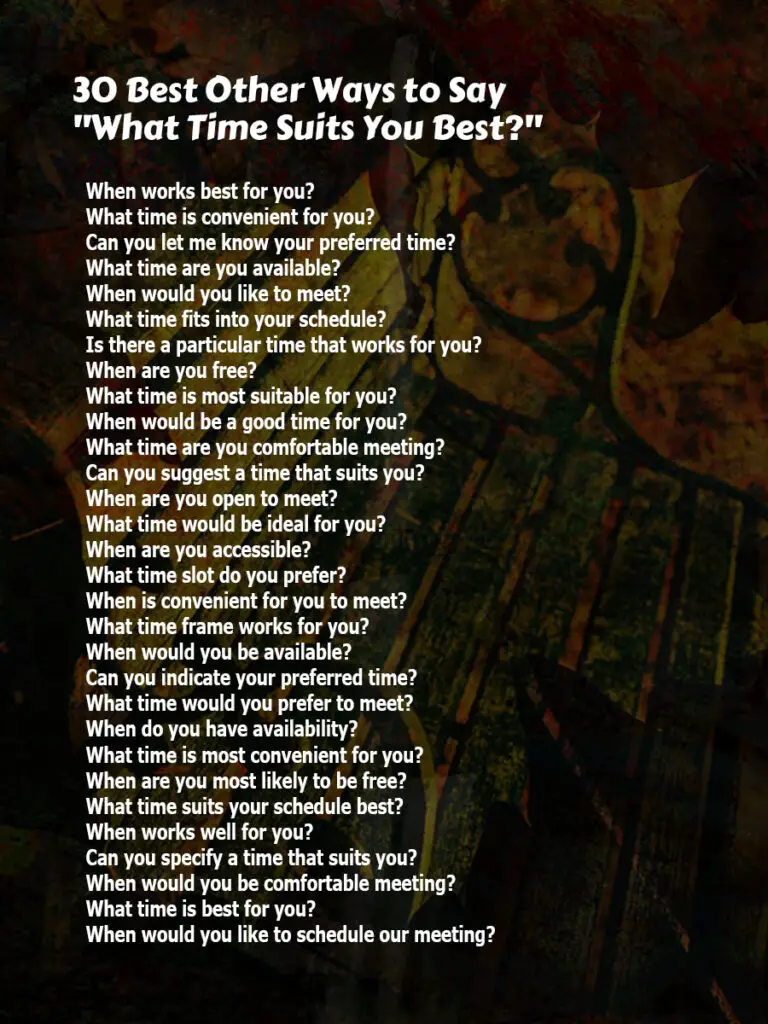Hey there! Have you ever wanted to ask someone when they’re available, but didn’t know how to say it? Well, you’re not alone! Figuring out the right words to ask “What time suits you best?” can be tricky. But don’t worry, because, in this blog post, we’re going to explore some easy and friendly ways to ask this question.
Whether you’re planning a meeting with a friend or scheduling a work appointment, it’s important to communicate clearly and politely. By learning different ways to phrase this question, you’ll feel more confident in your conversations and make scheduling a breeze.

Here are 30 Best Other Ways to Say “What Time Suits You Best?:
- When works best for you?
- What time is convenient for you?
- Can you let me know your preferred time?
- What time are you available?
- When would you like to meet?
- What time fits into your schedule?
- Is there a particular time that works for you?
- When are you free?
- What time is most suitable for you?
- When would be a good time for you?
- What time are you comfortable meeting?
- Can you suggest a time that suits you?
- When are you open to meet?
- What time would be ideal for you?
- When are you accessible?
- What time slot do you prefer?
- When is convenient for you to meet?
- What time frame works for you?
- When would you be available?
- Can you indicate your preferred time?
- What time would you prefer to meet?
- When do you have availability?
- What time is most convenient for you?
- When are you most likely to be free?
- What time suits your schedule best?
- When works well for you?
- Can you specify a time that suits you?
- When would you be comfortable meeting?
- What time is best for you?
- When would you like to schedule our meeting?
See Also: 30 Great Ways to Respond to “What Do You Want to Eat?”
Polite And Professional Phrasing
When scheduling a meeting or appointment, asking someone what time suits them best is not only polite but also vital for effective communication. Employing respectful inquiries and maintaining clear communication contributes to a professional and courteous conversation. Let’s explore the diverse ways to convey this message tactfully.
Respectful Inquiries
When seeking to know the most suitable time for the other party, it’s essential to use language that conveys respect and consideration. Polite phrases such as “May I inquire about the time that suits you best?” or “Would it be convenient for you to share the most suitable time?” reflect courteousness and show that you value the other person’s time.
Clear Communication
Clarity in communication is vital for understanding and responding appropriately. Using clear and direct language ensures that there is no ambiguity in the message. Phrases like “Could you let me know when it would be most convenient for you?” or “Please advise the time that works best for you” convey a sense of professionalism and understanding.
See Also: 25 Best Ways to Respond to “How Was Your First Day at Work?”
Alternative Ways To Ask
Explore diverse ways to inquire about suitable times, like “Can we set a time that works for you? ” Or “When is most convenient for you? ” Embrace creativity in phrasing to engage effectively in scheduling discussions.
Variety Of Options
When it comes to finding the perfect time that suits both parties, there are numerous alternative ways to ask the question. By diversifying your language and tailoring your approach, you can create a more engaging and effective conversation. Here are some different phrases to consider:
- What time works best for you? – This simple and straightforward question allows the other person to provide their preferred timing.
- Can you suggest a suitable time? – By asking for their suggestion, you show respect for their schedule and make them feel involved in the decision-making process.
- I’m flexible with the timing. What time suits you best? – By indicating your flexibility, you create an open and accommodating atmosphere, encouraging the other person to choose a time that suits them.
Tailoring To The Situation
Depending on the context and relationship with the person you are asking, you may want to adapt your approach. Here are a few suggestions for tailoring your question:
- Would you prefer a morning or afternoon meeting? – This question gives the other person a choice between two general time frames, making it easier for them to select the most convenient option.
- Is there a specific time slot that works better for you? – If you are aware of certain time constraints the other person may have, this question allows them to provide input regarding their availability.
- Shall we discuss a preferred time for our meeting? – By using inclusive language like “we” and suggesting a discussion, you establish a collaborative atmosphere and encourage the other person to engage in finding a mutually convenient time.
By using a variety of options and tailoring your question to the situation, you can make the process of finding the best time easier and more enjoyable for both parties involved.
Cultural Sensitivity
Understanding Different Norms
Different cultures have varying perceptions of time and scheduling. By familiarizing ourselves with these diverse norms, we can avoid unintentionally offending someone or causing confusion. Here are some key points to consider:
- Many Western cultures value punctuality and perceive time as a limited resource. Being on time is highly valued, and it’s advisable to schedule meetings in advance.
- In contrast, some cultures have a more relaxed approach to time, emphasizing flexibility and fluidity. In these cultures, it’s common to have a more flexible approach to scheduling.
- Some cultures prioritize collective harmony over strict adherence to schedules. Group consensus and consideration for others’ convenience may play a significant role in determining the appropriate time.
- When communicating with individuals from cultures that have strict hierarchies, it’s important to address the person with the highest authority or seniority first when discussing scheduling options.
Avoiding Misunderstandings
Misunderstandings can easily arise when approaching the topic of timing across cultures. To ensure effective communication, consider the following tips:
- Rather than assuming a specific time zone, ask if there are any time constraints or preferences that need to be considered.
- Use clear and precise language when discussing time options. Avoid ambiguous phrases that could lead to confusion.
- Be flexible and open to accommodating different cultural norms when scheduling. Show an understanding of their preferences and constraints.
- Consider using technology to facilitate scheduling across different time zones, such as online scheduling tools or calendar apps that display availability in multiple time zones.
By being culturally sensitive and aware of the different norms and potential misunderstandings, we can navigate the complexities of scheduling across cultures with ease. Through effective communication, we can bridge cultural gaps and ensure that everyone feels valued and respected. Remember, cultural sensitivity is key to fostering positive and successful collaborations in our diverse world.
Following Up Appropriately
Following up appropriately after asking someone about the best time for them requires a certain level of professionalism and courtesy. It’s important to confirm the agreed-upon time, express gratitude, and acknowledge the recipient’s response in a considerate manner.
Confirmation Of Time
Once you have discussed potential times that suit the individual, it’s essential to confirm the agreed-upon time. A concise email or message acknowledging the selected time will ensure clarity and prevent any confusion. This confirmation not only helps both parties to be on the same page but also portrays a level of reliability and organization on your part.
Thank You And Acknowledgment
Expressing gratitude for the recipient’s cooperation and flexibility is vital. A brief thank you message, along with a note of acknowledgment for their input, demonstrates your appreciation for their time and effort. This small gesture can leave a positive impression and maintain a courteous, professional relationship.

Conclusion
There are several ways to ask “What time suits you best? ” Each approach offers a different level of formality and politeness, allowing you to tailor your communication style to fit the context and relationship with the other person. By considering these options, you can effectively communicate and schedule meetings with ease.









